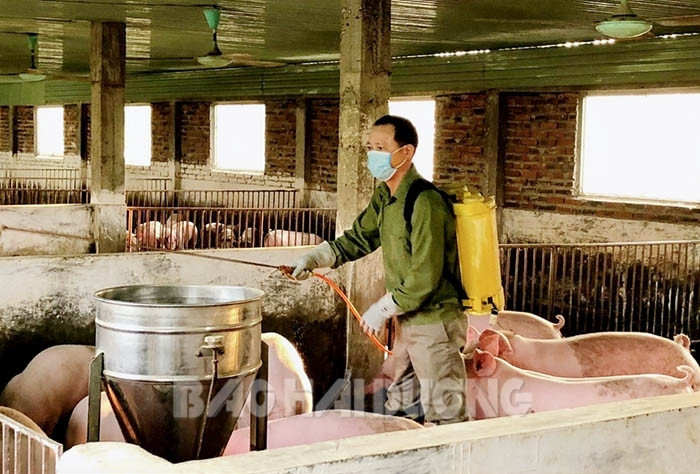Currently, the total herd of livestock and poultry in localities in the province is increasing to serve consumer demand during the 2023 Lunar New Year.

Households disinfect livestock barns 1-2 times/week to prevent disease.
Meanwhile, the weather forecast for the next few days may include severe cold spells and drizzle, which could affect the health of livestock. This is a favorable condition for pathogens to develop and spread. To proactively prevent disease in livestock during this period, farmers should pay attention to the following:
- Provide enough clean drinking water, reserve raw, green and concentrated food sources for livestock to proactively provide necessary nutrition, helping livestock cope with adverse weather conditions. Ensure that livestock barns are always kept warm, dry, regularly cleaned, and use chemicals to disinfect.
- Closely monitor and supervise the outbreak of epidemics: Livestock facilities need to monitor the health of livestock daily. If detected, they must be isolated, treated or handled promptly. If dangerous infectious diseases are suspected, they must be reported immediately to veterinary facilities. Do not hide epidemics or sell sick livestock and poultry into the environment. If there are dangerous epidemics, especially diseases such as avian influenza, foot-and-mouth disease, blue ear disease, septicemia, etc., it is necessary to take timely and thorough epidemic prevention measures according to the provisions of the Veterinary Ordinance, not allowing the epidemic to spread widely, causing economic losses to livestock farmers and society.
- Regularly clean and disinfect livestock areas, barns, livestock equipment, markets, slaughterhouses, and means of transport with appropriate chemicals such as RTD-Iotdine, Han-Iotdine, BKVet, Benkocid... Perform periodically 1-2 times/week according to the manufacturer's instructions.
Increase the use of disinfectants to limit the spread of pathogens through intermediaries, ensure biosafety in livestock farming to improve animal health and protect the ecological environment.
- Ensure food hygiene and safety, avoid spreading diseases during the process of slaughtering, transporting, trading, and consuming animals and animal products during Tet.
PV(synthetic)